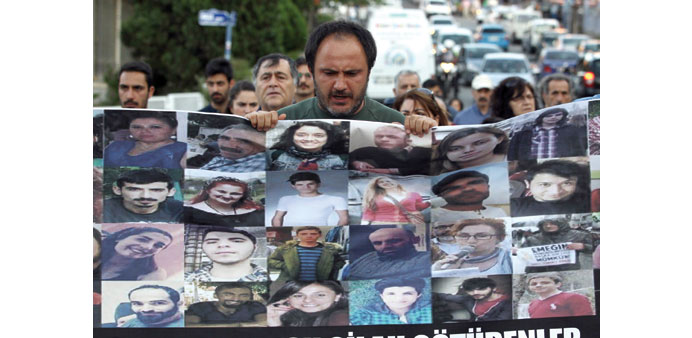A demonstrators marches in Ankara with a poster showing the faces of those killed in the suicide bomb attack in Suruc.
AFP/Sanliurfa, Turkey
Turkey took steps yesterday to bolster its frontier with Syria after a suicide bombing blamed on jihadists killed 32 people, as the country was shaken by a new deadly attack on police.
A day after the fatal shooting of two police officers claimed by Kurdish militants as “revenge” for Monday’s suicide bombing in the town of Suruc on the Syrian border, one officer was shot dead in the majority Kurdish city of Diyarbakir.
The unrest has intensified fears that the battle raging between Islamic State (IS) jihadists and Kurds inside Syria is now spilling over onto Turkish territory.
Deputy Prime Minister Bulent Arinc said after a cabinet meeting late on Tuesday that the government had discussed an “integrated system” to secure the frontier with Syria amid its civil war.
Turkish media reported on Wednesday that the measures were set to include sending zeppelins into the air several hundred metres high to monitor the border and building a concrete border wall.
Turkey also plans to put in place two fences separated by a military patrol road at the border, complete with observation towers at some locations, the Hurriyet daily said.
A moat will also be dug at some points.
Turkey has long been accused by its Western partners of failing to properly control the 911km (566-mile) frontier and even of colluding with IS, allegations it fiercely denies.
In places, the border has been marked only with a crude wire-mesh fence ridden with holes that has provided easy passage to militants and smugglers.
Prime Minister Ahmet Davutoglu meanwhile convened a meeting of security chiefs in Ankara to discuss further measures.
The attack in Suruc – which killed mainly young activists preparing for an aid mission to Syria – was the first time the government had explicitly blamed IS for a strike in the country.
It inflamed tensions with Turkey’s Kurdish minority, which is unhappy over the lack of support provided by the government to Kurdish militias fighting IS inside Syria.
The military wing of the Kurdistan Workers’ Party (PKK) claimed the killing of the two police in the border town of Ceylanpinar, accusing the two slain officers of collaborating with IS extremists.
Aged 24 and 25, they were given a funeral ceremony with full honours outside police headquarters in the regional centre of Sanliurfa, their coffins draped in the Turkish flag.
“The martyrs never die, the people will never be divided,” dozens of police officers chanted, using a well-known patriotic slogan.
The state Anatolia news agency said the three suspects had been arrested in early morning raids and were being questioned, without giving further details.
In new violence, one Turkish police officer was shot dead and another badly wounded in an attack yesterday by armed men during a routine traffic check in Turkey’s majority Kurdish-city of Diyarbakir, hospital sources said.
Meanwhile, the Patriotic Revolutionary Youth Movement (YDG-H), seen as a youth wing of the PKK, claimed it had shot dead an alleged former IS fighter in Istanbul late on Tuesday.
Turkey has so far stopped short of playing a full role in the US-led coalition assisting Kurds fighting IS militants who have taken swathes of Iraq and Syria.
However, the Hurriyet daily reported yesterday that Ankara had finally given the green light to US forces for use of the Incirlik air base in the campaign against IS in Syria.
It said that the accord was finalised in telephone talks on Wednesday between President Recep Tayyip Erdogan and his US counterpart Barack Obama.
Turkish officials have confirmed a 20-year-old Turkish man linked to IS carried out the suicide bombing in Suruc.
Media reports named the bomber as university student Seyh Abdurrahman Alagoz from Adiyaman in southeastern Turkey.
His father Zeynel Abidin Alagoz told the Dogan news agency that Abdurrahman had gone missing with his elder brother Yunus Emre six months ago.
Turkish media said a major hunt was now on for the brother, who had run a teahouse in Adiyaman that had become a known meeting place for IS sympathisers.
The unrest comes at a critical time for Turkey following elections in which the ruling Justice and Development Party (AKP) of Erdogan lost its overall majority in parliament for the first time since coming to power in 2002.

